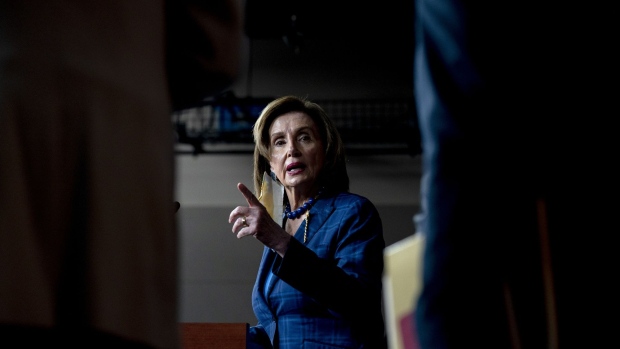Jul 30, 2021
Pelosi Fails in Eleventh-Hour Bid to Extend Eviction Moratorium
, Bloomberg News

(Bloomberg) -- House Speaker Nancy Pelosi’s bid for a last-minute extension of an eviction moratorium for renters collapsed Friday, leaving millions of Americans at risk of losing their homes after the ban lifts on Saturday.
It was a rare political defeat for Pelosi, who has exercised tight control over House Democrats but was unable to unify them behind the effort.
The House adjourned Friday without taking up legislation to extend the moratorium until Oct. 18. That came after a day of arm-twisting by the speaker and her leadership team as they tried to find the votes.
“We’re counting, we’re counting,” Majority Leader Steny Hoyer said.
At the same time, landlords were pushing hard against any further extension of the moratorium, calling it “unsustainable” for mom-and-pop renters in particular.
“While well-intentioned, the national eviction moratorium has made providing rental housing unaffordable for many property owners,” the National Multifamily Housing Council said in a statement.
Congress has approved $47 billion in rent relief funding since December, but state programs to distribute that money have been mired in bureaucracy and miscommunication, a growing frustration for renters and landlords alike.
Amid the landlords’ lobbying push, Democrats’ vote-counting had just gotten harder. Pelosi swore in a new Republican House member Friday morning, bringing the Democratic majority to 220 to 212. Pelosi could only lose three Democratic votes, if every Republican votes in opposition.
Reality was setting in by late afternoon that there were simply not enough Democratic votes in the House. Even if there were, chances of a moratorium extension getting through the Senate were dim.
The speaker was still portraying the fight for passage as continuing, publicly releasing a second “Dear Colleague” letter to colleagues urging them to back the extension.
Pelosi picked up some support when she agreed to shorten the extension of the moratorium from Dec. 31 to Oct. 18.
But several Democrats, particularly moderates, could not be persuaded, multiple people familiar with the effort said.
One Democratic official, expressing anger, said the effort by mid-afternoon was little more than theater. Pelosi continued to publicly project that she was fighting hard, but her aides were growing resigned to defeat and increasingly resentful of President Joe Biden, the official said, speaking on condition of anonymity to discuss private conversation.
The deadline was no secret on Capitol Hill or at the White, but Republicans and some Democrats faulted Biden for waiting until Thursday to make a public plea to extend the moratorium.
“President Biden has called on us to act without delay to extend a national eviction moratorium that is scheduled to expire on Saturday,” House Rules Committee Chairman Jim McGovern said Friday. “I quite frankly wished he’d asked us sooner.”
‘Reckless’
Democratic Representative Alexandria Ocasio-Cortez called the administration’s lack of action “reckless and irresponsible.”
“So now we’re scrambling but it could have been avoided with better communication and frankly more forthright leadership from the White House,” she said on Thursday.
The White House responded that the administration had been working with local government to get aid money already approved out to renters and landlords.
“We have been working really hard in a whole of government approach that we do here at this White House and this administration and we’ll continue to do that,” deputy press secretary Karine Jean-Pierre said.
The White House said its own hands were tied by an opinion last month from Justice Brett Kavanaugh that signaled Congress -- and not the administration -- would have to authorize any additional extensions.
Some Democrats pointed their fingers at the Supreme Court, while others blamed governors for failing to distribute rent relief funds quickly enough.
Millions at Risk
Pelosi, in a Thursday night letter to fellow lawmakers, called the extension a “moral imperative” as the nation battles rising Covid-19 cases.
Several federal agencies stepped in after Biden’s Thursday plea to provide moratoriums for smaller segments of renters through the end of September. New York and California have their own moratoriums through August and September, respectively, as do some other states.
But that covers just a fraction of the estimated 3.6 million households at risk for eviction, according to the most recent Census Bureau survey. A total of 7.4 million renters have said they’ve fallen behind on rent during the pandemic.
Disparate state and local distribution programs have been mired in bureaucracy and lackluster outreach efforts have left millions unaware that help is even available.
Treasury had distributed the first tranche of funds, totaling $25 billion, to state and local jurisdictions by early February. Only 6% of that money had been disbursed to tenants and landlords by the end of May, with more than 80 jurisdictions having yet to start.
Distribution picked up in June, with more money distributed than all previous months combined. But the vast majority of the $47 billion total allocation remains unspent.
In the meantime, millions of Americans could find themselves in eviction proceedings as soon as Monday.
©2021 Bloomberg L.P.